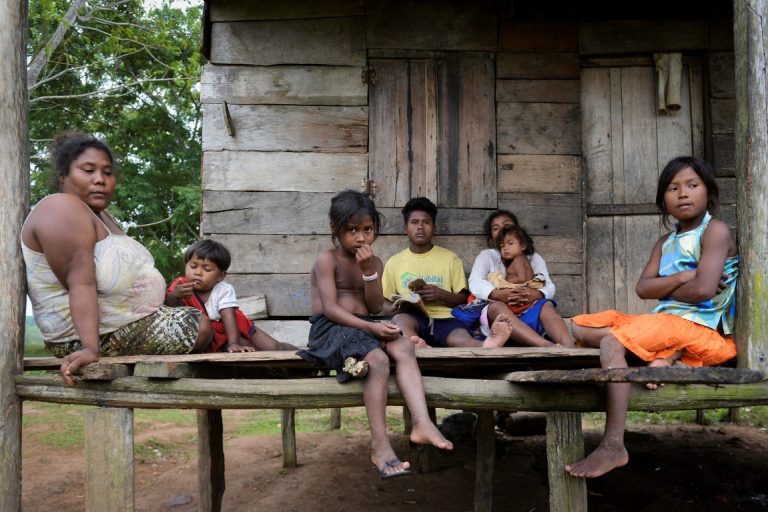19 de noviembre 2019

Children of Exile: The Births “Sowing Hope” in the Camp of Nicaraguan Farmers

PUBLICIDAD 1M
PUBLICIDAD 4D
PUBLICIDAD 5D
Daniel Ortega heads the country into its third year of consecutive recession, with more than two million Nicaraguans in poverty

Nicaragua is heading for a third consecutive year of economic contraction in 2020, which will result in open unemployment for at least 237,000 people, and a poverty level above two million Nicaraguans, according to estimates of the Nicaraguan Foundation for Economic and Social Development (Funides), whose economists urged for a political solution to the crisis.
Funides economists project that the economy will contract -1.1% in 2020, a figure much lower than -5.9 of 2019 and -3.8 in 2018. However, the decrease “demonstrates the depth of the recession in which we are involved. It also indicates that we are at a fairly severe level of economic stagnation,” said one of the experts.
The estimate of Funides is based “on the scarce and outdated” information provided by the regime, which since mid-2018 gradually hides social and economic reports and data, which show an economic deterioration.
Ineffective measures
A Funides’ economist, who by policy of the institution does not allow him to publish his name, said that the measures of the regime, in economic terms, have not accelerated a way out of the recession, which “proves the inefficiency of the economic policies implemented by the Government to combat the current crisis.”
Another economist stressed that the dictatorship has focused on maintaining macroeconomic stability in the short term, and has not implemented measures to boost demand and employment.
“Maintaining fiscal stability, facilitating liquidity to the Nicaraguan banking system and protecting international reserves, are the three objectives of the measures adopted by the Government,” explained the Funides expert.
At the end of last October, the Central Bank of Nicaragua (BCN) reduced the devaluation of the Cordoba from 5% annually to 3%, which for the economists of Funides will not help an economic recovery. “It is a measure that helps the deficit of the non-financial public sector, call them state companies or INSS (Social Security National Institute).
The economist advocated for a potential political solution to the crisis, which would “accelerate” the end of the recession. “These three years of recession could have been relieved with a political agreement,” one of the experts added.
Impact on the population
Funides projections reveal that GDP per capita will be reduced for the third consecutive year, to $1,829; fifty dollars less than in 2019 and $202 dollars below 2018.
“With the fall in GDP per capita, poverty increases, people’s purchasing power is reduced and the unemployment rate increases,” said one of the specialists.
The open unemployment rate—people who want to work, are looking for a job, but cannot find it—will be around 7.3%, which represents some 237,000 people, by the end of 2020. For this 2019, Funides calculates an unemployment rate of 7%, about 227,000 people.
Economists recalled that their calculations are only estimates, since they do not have accurate data. “For this year (2019) we have not had any data on the unemployment rate.”
Two million poor
Three continuous years of economic recession will lead us to more than two million Nicaraguans living in poverty by the end of 2020, according to Funides.
What does it mean to live in poverty? That they will have less than $1.76 a day for all their needs, with that they have to eat, dress, study and go to the doctor,” said one of the economists.
During these three years, the poverty rate will have risen by 11 percentage points, from 20.1% in 2017, to 31.9% in 2020, according to Funides’ data.
“To reduce those 10 percentage points, it will take more than a five-year period. It will be hard work after the crisis, to return to the levels of well-being that we had prior to it,” said one of the economists.
Internal and external risks
Despite the bleak picture of 2020, Funides analysts underlined that there are internal and external risks that could further overshadow the country’s economic future.
Among the internal risks, they emphasized an increase in violence against civic protests; the lack of public sector financing; greater deficit in public companies and of the Social Security Institute (INSS), as well as a deterioration in the country’s risk ratings.
The external risks are three: a recession in the US economy; a reduction in international prices of export products; and new condemnation resolutions within the Organization of American States (OAS) that would put international loans at risk.
Archivado como:
PUBLICIDAD 3M
Confidencial es un diario digital nicaragüense, de formato multimedia, fundado por Carlos F. Chamorro en junio de 1996.
PUBLICIDAD 3D